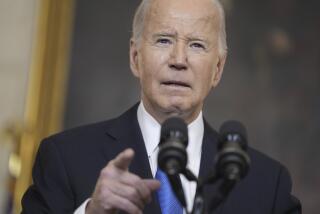Bail out the bailout
- Share via
No one in Washington has a better view of the global credit markets than Treasury Secretary Henry M. Paulson and Federal Reserve Chairman Ben S. Bernanke. So when they say the situation is dire, it’s not as if a couple of flightless birds were saying the sky was falling.
So why did the House vote down the rescue package Monday that Paulson and Bernanke said was so desperately needed? Blame haste, partisanship, timidity and brinkmanship -- they all played a role. More important, though, was Washington’s failure to convince taxpayers that a dramatic bailout was vital to their health, not just Wall Street’s. The responsibility starts with President Bush, Paulson and Bernanke, but it extends to lawmakers as well. Apparently no one in Congress wanted to be accountable for what amounted to a $700-billion experiment in fiscal intervention. Republicans, who absurdly claimed it was the Democratic majority’s responsibility to deliver the votes, sounded thin-skinned when they denounced Speaker Nancy Pelosi’s ill-timed criticism of GOP policies. And Democrats, who portrayed the bailout as the work of Republican administration officials, seemed determined not to be left holding the bag for Paulson and Bernanke.
We remain convinced that the problems in the financial industry are real and that they could be poisonous to the entire economy, not just the stock market. Yet the administration’s lackluster sales job has allowed opponents of the bailout to promote minimal or Darwinian responses. With lame-duck Bush unable to rally congressional Republicans, the role of deal-closer fell to John McCain. But it’s hard for a maverick to impose party discipline; McCain’s camp claimed that he moved 61 GOP votes into the yes column, but that still left close to 70% voting no. Before the feds can ride to the rescue, someone is going to have to convince more Republicans that it’s worth the effort.
Congress may take up a very similar bailout proposal later this week. In the meantime, Bush and top administration officials need to speak more often and more persuasively about the nature of the problem. They need to distance themselves from Paulson’s initial request for unfettered authority and embrace the oversight Congress demanded. Meanwhile, lawmakers need to stop trying to turn the bailout plan into a referendum on the administration’s policies, presidential candidates or anything other than the specifics of the proposal. Opponents can and should try to reduce its cost and increase market discipline. But they can’t pretend that it’s someone else’s problem to fix.
More to Read
A cure for the common opinion
Get thought-provoking perspectives with our weekly newsletter.
You may occasionally receive promotional content from the Los Angeles Times.










